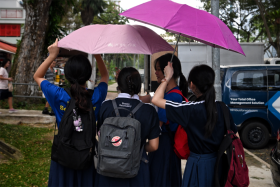Elderly need to be vaccinated too
Pneumonia is third leading cause of death here
Pneumonia is said to be an old man's friend - it accompanies him to the end of his life.
But as the third leading cause of death here, the lung infection can hardly be considered a friend, said Dr Leong Hoe Nam, an infectious disease physician at Rophi Clinic.
Pneumonia happens when a germ invades the respiratory system.
"The germs break through the natural barriers and overwhelm the local defence systems. The viruses in particular pair up with the bacteria for a doubly potent infection.
"The viruses do the first wave, and the bacteria that are hiding at the back of the throat fall in the lungs and deliver the second blow. Sometimes, this can be fatal," he said.
The young and the old are at risk, as with those with pre-existing conditions such as diabetes and heart disease.
The young will likely recover from it, but the old may die.

A healthy lifestyle, while encouraged, is no panacea for all infections.
Dr Leong said: "The best gift anyone can give their elderly loved ones would be a gift of vaccine. A yearly influenza vaccine coupled with the two pneumococcal vaccines (PCV 13 and PPV 23) taken at 65 is the best assurance that the elderly stay healthy with us.
"The vaccines are now Medisave-claimable."
WHAT ARE SOME COMMON SYMPTOMS OF PNEUMONIA?
Common symptoms include fever, cough, breathlessness and phlegm. The patient may have one or all of these symptoms. To complicate matters, some patients (such as those with tuberculosis or mycoplasma) may have pneumonia and yet not know it.
WHAT HAPPENS IF IT IS LEFT UNTREATED?
If untreated, it will gradually worsen. The patient will feel unwell and become increasingly lethargic. Some individuals may feel breathless as the disease worsens. By this time, the patient will seek medical help and require hospitalisation.
With appropriate treatment, most patients recover, but some may first require mechanical ventilation. Some eventually die.
HOW CAN PNEUMONIA BE PREVENTED?
We can minimise pneumonia risk by keeping healthy, not smoking, avoiding industrial smoke and haze, and being compliant to the treatment for existing illnesses such as diabetes and chronic renal failure.
If your immunity is low, you should also avoid crowded places.
Understanding that pneumonia is caused by viruses and bacteria, and that they cooperatively strike the patient, it makes sense to be vaccinated against them. Two vaccines that will help include the 4-valent (4 in 1) influenza vaccination and the pneumococcal vaccination.
The best gift anyone can give their elderly loved ones would be a gift of vaccine.
For maximum benefit, individuals should take the influenza vaccination yearly, and both types of pneumococcal vaccination (PCV 13, PPV 23) at 65 years old.
These pneumonia vaccinations can be taken earlier (before 65) if there are other pre-existing conditions.
WHY DO THE ELDERLY NEED THE VACCINATION?
We are used to the young getting vaccinations but not the old. In fact, many elderly patients say they are strong as they grew up eating "rubbish". They fail to recognise that the immune system gradually fails with time. And we need vaccinations to help bring our immunity up to par.
Unlike temperate countries, where there is a winter season, we are not reminded to go for our annual influenza vaccinations. This becomes a missed opportunity to remind the elderly to take their pneumonia vaccine at the age of 65.
Similarly, the short consultations doctors have with their patients do not provide the time for discussion on vaccinations.
Get The New Paper on your phone with the free TNP app. Download from the Apple App Store or Google Play Store now



